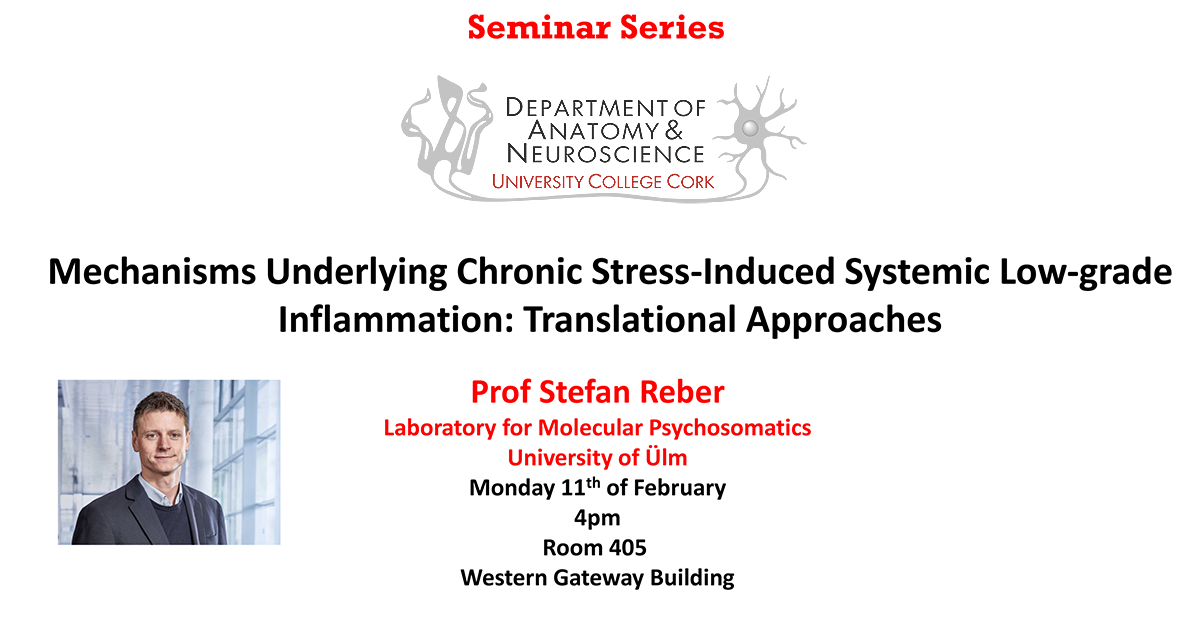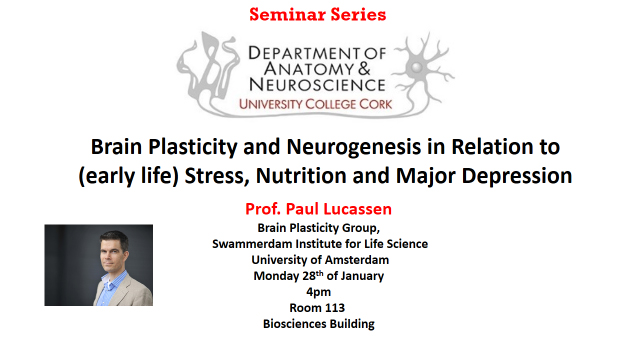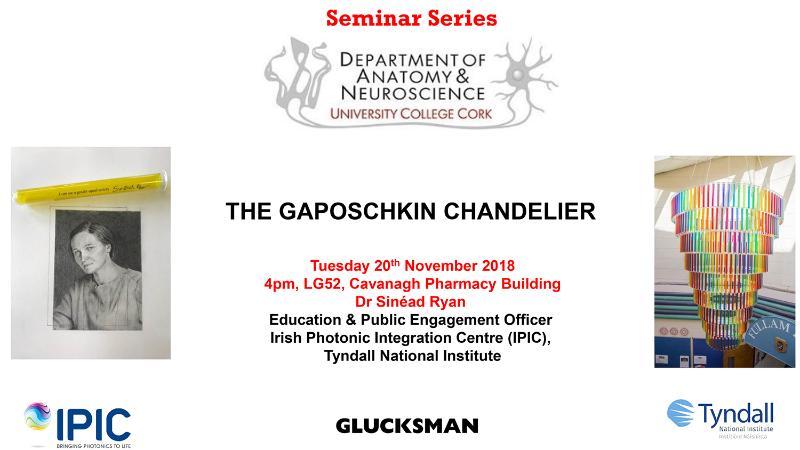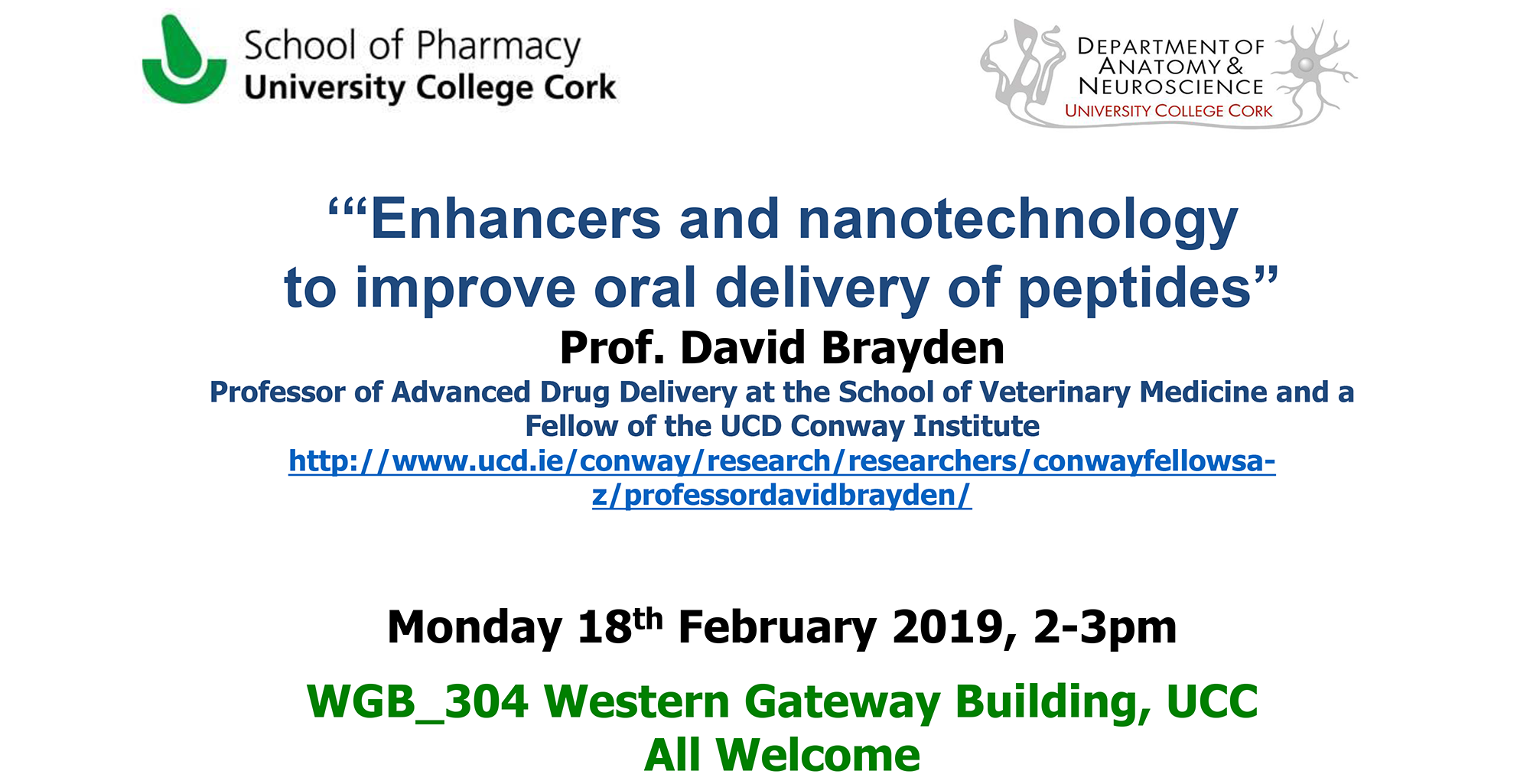In This Section
- Home
- Staff Profiles & Phone Book
- About the Department
- Welcome from Head of Department of Anatomy and Neuroscience
- A History of the Department
- A history of the Department; The early years to the 1980s
- A history of the Department; The move from the Windle Building to BSI and WGB
- UCC Professors of Anatomy and Heads of Department
- The development of the UCC HUB
- Current students, recent research graduates and awards
- Useful Links
- Study Anatomy
- Study Neuroscience
- Research
- Neural circuitry underlying Neuropsychiatric and Neurological Disorders 2026
- Neurogastroenterology 2026
- Developmental Neuroscience and Regeneration 2026
- Neurodegeneration 2026
- Neuroinflammation 2026
- Neuroprotection and Therapeutics 2026
- Neuroproteomics and Molecular Psychiatry 2026
- Anatomy Education Research 2026
- Research Facilities 2026
- Postgraduate Research Programmes 2026
- UCC Anatomical Donations
- Biosciences Imaging Centre
- BSc Medical and Health Sciences
- News & Events
- News Archive 2024
- News Archive 2023
- News Archive 2022
- News Archive 2021
- News Archive 2020
- News Archive 2019
- News Archive 2018
- News archive 2017
- News Archive 2016
- News Archive2015
- News Archive 2014
- News Archive 2013
- News Archive 2012
- News Archive 2011
- BRAIN AWARENESS WEEK 2023
- Department Events and Conferences
- Seminar series 2019_2020
- photo galleries
- Narrowing the void Conference 2023
- Photos of BSc Medical and Health Sciences Mentoring launch 2022
- International Women's Day 2023
- 2023 BRIGHT FUTURES - Celebrating our researchers
- 2023 UCC Futures - Future Ageing & Brain Sciences
- Recent Graduations July 2023
- Anatomy and Neuroscience Top 100 Anatomy Physiology 2023
- BRAIN AWARENESS WEEK 2023 FUN AND GAMES EVENT
- Medical and Health Sciences First year class 2023
- 2023 Brain Awareness week Scientific discussion photo gallery
- World Anatomy Day 2023
- BSc MHS MENTORING PROGRAMME 2023
- BSc Medical and Health Sciences Graduation 2023
- BSc Neuroscience Graduation Photo Gallery 2023
- Dr Kathy Quane Nov 2023
- THANKSGIVING PHOTOS 2012
- Photo Gallery: Society of Translational Medicine Careers Fair 2023
- Photo Gallery:2023 TRAIN AWARDS
- Photo Gallery:2024 Creative Week St Joseph's NS
- Photo Gallery: Department of Anatomy and Neuroscience Thanksgiving Service 2024
- Photo Gallery: Professor Aideen Sullivan farewell party
- Photo Gallery: Irish Pain Society Annual Scientific Meeting Cork 2023
- Photo Gallery: 2024 Medical and Health Sciences Graduation
- Photo Gallery: Medical and Health Sciences Meet and Greet 2024
- Photo Gallery: 2024 BSC NEUROSCIENCE Graduation
- Photo Gallery: 2025 INTERNATIONAL WOMEN'S DAY
- Photo Gallery: 2025 BSc Neuroscience class and staff
- Photo Gallery: 2025 BRAIN CONNECTIONS
- BSc Neuroscience Graduation Photo Gallery 2025
- World Anatomy Day 2025
- UCC Learning and Teaching Showcase 2025
- MSc Human Anatomy Graduation Photo Gallery 2025
- Narrowing the Void Conference 2023
- Department of Anatomy and Neuroscience Contact Us
edBR.jpg)
SEMINAR: In Sync: Music, Synchrony, and Cognition
PRESENTED BY: Dr Alexander Khalil, Dept of Music, University College Cork, Cork.
BIOGRAPHY:
Alexander Khalil is an ethnomusicologist and cognitive scientist specializing in music learning and transmission, musicality in human interaction, and the perception of time. Informed by his long experience as a chanter in the Greek Orthodox tradition, his ethnographic work investigates timing and temporality amongst chanters both at ancient centers of the tradition, such as Constantinople (present-day Istanbul), and in diaspora. Khalil's work in cognitive science connects the ability to synchronize—or co-process time—rhythmically with other cognitive skills such as attention behaviour and so links the practice of music to broader areas of cognition. Khalil received his doctorate in music at the University of California, San Diego in 2009. Upon completing his Ph.D., Khalil joined the department of Cognitive Science at UCSD as a postdoctoral scholar and fellow at the Temporal Dynamics of Learning Center, a National Science Foundation Science of Learning Center. In 2014 he joined the Institute for Neural Computation, also based at UCSD, as a project scientist where he developed methods for EEG recording with multiple people, also known as “hyperscanning”, in ecological environments.
WHEN: Monday 1st April 2019. 4.00-5.00pm
WHERE: Room 405 Western Gateway Building.
ALL WELCOME
WEBSITE: https://www.ucc.ie/en/anatomy/news/seminarseries2018-2019/
______________________________________________________________________________________
SEMINAR: Enhancers and nanotechnology to improve oral delivery of peptides
PRESENTED BY: Prof. David Brayden Professor of Advanced Drug Delivery at the School of Veterinary Medicine and a Fellow of the UCD Conway Institute
BIOGRAPHY: http://www.ucd.ie/conway/research/researchers/conwayfellowsa-z/professordavidbrayden/
WHEN: Monday 18th of February 2019, 2-3pm.
WHERE: Room 304 Western Gateway Building.
ALL WELCOME
https://www.ucc.ie/en/anatomy/news/seminarseries2018-2019/
 _______________________________________________________________
_______________________________________________________________
 SEMINAR: Mechanisms Underlying Chronic Stress-Induced Systemic Low-grade Inflammation: Translational Approaches
SEMINAR: Mechanisms Underlying Chronic Stress-Induced Systemic Low-grade Inflammation: Translational Approaches
PRESENTED BY: Professor Stefan Reber, Laboratory for Molecular Psychosomatics, Clinic for Psychosomatic Medicine and Psychotherapy, University of Ulm, Germany
WHEN: Monday 11th of February, 4-5pm.
WHERE: Room 405 Western Gateway Building.
ALL WELCOME
https://www.ucc.ie/en/anatomy/news/seminarseries2018-2019/
________________________________________________________________________________________

SEMINAR: Brain Plasticity and Neurogenesis in Relation to (early life) Stress, Nutrition and Major Depression.
PRESENTED BY: Prof Paul Lucassen, Brain Plasticity Group, Swammerdam Institute for Life Science, University of Amsterdam, Netherlands.
WHEN: Monday 28th of January, 4pm
WHERE: Room 113, Biosciences Building.
ALL WELCOME
ABOUT: Lucassen Cork 2019
_________________________________________________________________________________________________________________

The Chandelier is inspired by Cecilia Payne Gaposchkin, who in 1925, discovered what stars are made of by observing the absorption lines in the spectrum of light they emit. Her profound discovery would change how we understand the physical universe forever...
Based on the spectrum of light from our nearest star, the Sun, The Gaposchkin Chandelier will be made with 603 test tubes each containing a symbolic absorption line. The absorption lines say 'I can see a gender equal society' and mark UCC's commitment to addressing gender representation in STEM. Through an increase in colour over time, it will reflect our progress towards having 50% female researcher representation across all levels, from PhDs right through to Professors. We are looking for 603 staff and students to add their signature to these absorption lines which will be stored in one of the test tubes and ultimately form part of the The Gaposchkin Chandelier.
At Tuesday’s seminar, you are invited to hear a brief overview of the project. You will then have the opportunity to add your signature to an absorption line which will permanently form a part of The Chandelier.
______________________________________________________________________________________________________________
Department of Anatomy and Neuroscience
Anatamaíocht agus Néareolaíocht
Contact us
Room 2.33, 2nd Floor, Western Gateway Building, University College, Cork, Ireland


